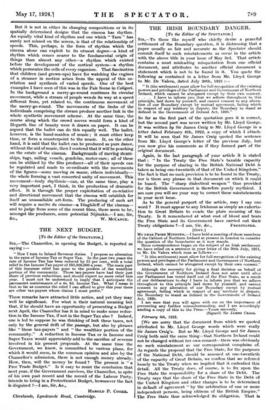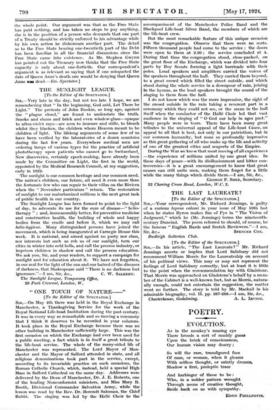THE IRISH BOUNDARY DANGER.
[To the Editor of the SPECTATOR.] SIR,—To those like myself who chiefly desire a peaceful settlement of the Boundary question, it is distressing that a paper usually so fair and accurate as the Spectator should commit itself to such misstatements as occur in the article with the above title in your issue of May 3rd. That article contains a most misleading misquotation from one official document, and attributes to another official document a statement which is not to be found in it. You quote the following as contained in a letter from Mr. Lloyd George to Mr. De Valera, dated July 20th, 1921 :- " It (the settlement) must allow for full recognition of the existing powers and privileges of the Parliament and Government of Northern Ireland, which cannot be abrogated except by their own consent. . . . I have to inform you that we adhere throughout to this principle, laid down by yourself, and cannot consent to any altera- tion of our Boundary except by mutual agreement, failing which in respect of any territory in dispute, the Boundary to stand as defined in the Government of Ireland Act, 1920."
So far as the first part of the quotatiOn goes it is correct, but the second part was never written by Mr. Lloyd George. It was written by Sir James Craig to Mr. Lloyd George in a letter dated February 6th, 1922, a copy of which I attach. It will be seen that Sir James Craig quoted the sentence from Mr. Lloyd George's letter of the previous July, but you now give his comments as if they formed part of the original document.
Again, in the last paragraph of your article it is stated that : " In the Treaty the Free State's taxable capacity for the purpose of sharing in the British National Debt is taken as being one-twentieth of that of the United Kingdom." The fact is that no such provision is to be found in the Treaty, nor is there any phrase in that document on which it could be based. The " sharp dialectical weapon " thus provided for the British Government is therefore purely mythical. I am sure you will see your way to correct these misstatements in your next issue.
As to the general purport of the article, may I say one word ? It must appear to any Irishman as simply an exhorta- tion to Great Britain to evade the plain meaning of the Treaty. Is it remembered at what cost of blood and tears the Free State and its Government have carried out their
Treaty obligations ?—I am, Sir, &c., FREESTATER.
[COPY.] MY DEAR Purim MirresTER,—I have held a meeting of those members of the Cabinet of Northern Ireland at present in London to consider the question of the boundaries as it now stands.
Sines correspondence began on the subject of an Irish settlement we have relied on a sentence in your letter of the 20th July, 1921, to Mr. De Valera which runs as follows ;— " It (the settlement) must allow for full recognition of the existing powers and privileges of the Parliament and Government of Northern Ireland, which cannot be abrogated except by their own consent."
Although the necessity for giving a final decision on behalf of the Government of Northern Ireland does not arise until after our Parliament has voted itself out of the Free State, as a result of our deliberations to-day I have to inform you that we adhere throughout to this principle laid down by yourself, and cannot consent to any alteration of our Boundary except by mutual agreement, failing which in respect of any territory in dispute, the Boundary to stand as defined in the Government of Ireland Act, 1920.
I run sure that you will agree with me on the importance of preventing any further misunderstanding, and I am accordingly sending a copy of this to the Press.—Yours sincerely,
[We are sorry that the document from which we quoted attributed to Mr. Lloyd George words which were really Sir James Craig's. But as Mr. Lloyd George and Sir James Craig both said the same thing—that Northern Ireland could not be changed without her own consent—there was obviously no such misstatement as our correspondent complains of. As regards the proposal that the Free State, for the purposes of the National Debt, should be assessed at one-twentieth of the capacity of Great Britain, we confess that we referred loosely to the Treaty when we implied that it embodied this detail. All the Treaty does, of course, is to fix upon the Free State the responsibility for a share of the Debt. The Treaty says that the share of the Free State in the Debt of the United Kingdom and other charges is to be determined in default of agreement " by the arbitration of one or more independent persons, being citizens of the British Empire." The Free State thus acknowledged its obligation. That is the whole point. Our argument was that as the Free State has paid nothing, and has taken no steps to pay anything, she is in the position of a person who demands that one part of a Treaty should be strictly enforced to his advantage while by his own action he dishonours another part. The detail as to the Free State bearing one-twentieth part of the Debt has been familiar in all the financial discussions since the Free State came into existence. As Mr. Stephen Gwynn has pointed out the Treasury now thinks that the Free State capacity is only about one-fortieth. Our correspondent's argument is as relevant as saying that if one misquoted the date of Queen Anne's death one would be denying that Queen Anne waa dead.—En. Spectator.]



















































 Previous page
Previous page